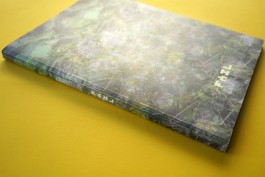'Fail' is a book depicting the aesthetics of failure in archiving memories. Memories become stutterer, volatile, and uncertain. Their profiles - evanescent per se - need to be clarified. Their meanings are scattered and lost in an endless ocean of images. Hence, the title "Fail" can mean disappointment, omission, damage, or failure. According to Plato, "to know" is "to remember". As a fact, without memories, we do not exist. Humans find in memories the solution for their experience not to be excluded from the world, to create that mark that makes it unique, and to compensate for a weak instinct. For this reason, since ancient times, communities have strived to pass on, preserve, and store memories. Oral tradition, writings, and arts were originally all different types of collective memory. On the contrary, individual memory storage is quite a recent conquest that became endemic thanks to evolving means of duplication and the spread of images. Technology is substituting personal memories since the present moment can be immediately shared, and efforts in remembering are no longer necessary.
Stefano Parrini
urbanautica.com (review)














'Fail' is a book depicting the aesthetics of failure in archiving memories. Memories become stutterer, volatile, and uncertain. Their profiles - evanescent per se - need to be clarified. Their meanings are scattered and lost in an endless ocean of images. Hence, the title "Fail" can mean disappointment, omission, damage, or failure. According to Plato, "to know" is "to remember". As a fact, without memories, we do not exist. Humans find in memories the solution for their experience not to be excluded from the world, to create that mark that makes it unique, and to compensate for a weak instinct. For this reason, since ancient times, communities have strived to pass on, preserve, and store memories. Oral tradition, writings, and arts were originally all different types of collective memory. On the contrary, individual memory storage is quite a recent conquest that became endemic thanks to evolving means of duplication and the spread of images. Technology is substituting personal memories since the present moment can be immediately shared, and efforts in remembering are no longer necessary.
Stefano Parrini
urbanautica.com (review)















Hi! I am Steve, a professional in the field of photography and visual arts, with a background as a curator, art director, and educator.
Venetian on my father’s side, with a French surname that dates back to Napoleon’s campaigns, and a soldier from around Montpellier. My mother was born in Belgium to a Dutch family. My grandfather from Hoboken, New Jersey, on the Hudson River. I grew up a bit here and there; I currently live in Paris.
I have known the world before smartphones, computers, and the internet. Before low-cost flights. The backseat of my father's car was my window. Studies pushed me to embrace complexity, a quite observation. A gaze that "touches," that dares in some way, that strives to forge a connection.
I spent the past 20 years questioning the role of images in society.
• Coaching and Portfolio Review
Go to Coaching and Portfolio Review page
Steve Bisson has also been delivering lectures, mentoring, and collaborating extensively with leading cultural and educational institutions around the world for the past 15 years.
—
Design by Roberto Vito D'Amico

Hi! I am Steve, a professional in the field of photography and visual arts, with a background as a curator, art director, and educator.
Venetian on my father’s side, with a French surname that dates back to Napoleon’s campaigns, and a soldier from around Montpellier. My mother was born in Belgium to a Dutch family. My grandfather from Hoboken, New Jersey, on the Hudson River. I grew up a bit here and there; I currently live in Paris.
I have known the world before smartphones, computers, and the internet. Before low-cost flights. The backseat of my father's car was my window. Studies pushed me to embrace complexity, a quite observation. A gaze that "touches," that dares in some way, that strives to forge a connection.
I spent the past 20 years questioning the role of images in society.
• Coaching and Portfolio Review
Go to Coaching and Portfolio Review page
Steve Bisson has also been delivering lectures, mentoring, and collaborating extensively with leading cultural and educational institutions around the world for the past 15 years.
—
Design by Roberto Vito D'Amico